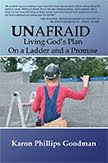Though you search for your enemies, you will not find them.
Those who wage war against you will be as nothing at all.
For I am the Lord, your God, who takes hold of your right hand and says to you,
Do not fear; I will help you.
Isaiah 41:12-13
I don’t know how prevalent the fear of rejection is, but based on just what I’ve witnessed myself, it’s massive. Maybe it’s because we quite often try to be “people pleasers” and make everyone else happy at all costs. While there’s nothing wrong with being accommodating and thoughtful, what can happen is that we end up being too agreeable and are easily taken advantage of in an effort to be liked and accepted. And then it gets worse.
Sometimes we just never even attempt anything of our own or dare to dream our own dreams so that we won’t upset anyone else’s life or have to face criticism or rejection. It may seem like an easier life, but it’s never what God intends. Living with a fear of rejection means living a stunted, cluttered life – like a half-built house given way to the elements, overgrown grasses and condemned notices tacked on its splintered door facings. It’s a life unlived.
God doesn’t deal in rejection the way we see it—He doesn’t require perfection in our efforts or success in the world every time we venture out. We often make those requirements of ourselves, though, so afraid of being turned away or turned down, so fearful of being who we are because we think that isn’t enough. God knows something else. He knows that what makes us acceptable to Him is our willingness to live with Him in charge. Then rejection isn’t an issue—it’s all about reflection instead.
We accept God’s acceptance—trusting Him to never reject us and always lead us. And we reflect Him and His grace, forgiveness, generosity, care, everything in every effort we make. And in the security of God’s love and acceptance, we find purpose in all we do—it’s about reflecting Him the best we can [and we learn better every day, He’s a patient teacher] and leaving the worry and fear behind.
That means being a “God pleaser” instead of a “people pleaser” – being willing to risk rejection and overcome the setbacks because He’s still guiding us to our goals.
Rejection by those we love or hope to impress hurts, but it helps to remember that in all of that pain or sadness, God has a plan. He has a plan better than the one we see and we can only be a part of it if we continue to build. Wherever we’ve met shut doors and failed ideas, we look for what’s facing us when we turn away from the rejection. God’s still there, so our security is still there. And if we’re still here, we’ve still got a purpose that God will protect, no matter how often we feel like a letter with the wrong address on it.
There’s no rejection when we’re building what God’s said build. And today it may only be one nail in a whole big wall – one effort to reach out to someone and risk a rejection – but it’s enough if it’s what God asks today. Overcoming fears usually isn’t about one big, giant impressive act, but all those steady, small, one-to-one efforts made in trust that become scaffolding on which we stand to build a bigger temple.
-what in the past has caused you to fear rejection? What pain do you still carry from times of rejection that impact your behavior today?
-when have you overcome the fear of rejection to do what you wanted or needed to do, or what’s going on in your life right now that asks that of you?
o ~ o ~o
Please visit May's Partner Blogger: Terry at Breathing Grace and join her as well as we explore this topic.
Read below or download the study of Moses for yourself or your group.
Thanks for being part of our tour . . . please post your comments and stories for all our readers. See you soon! God bless you.


